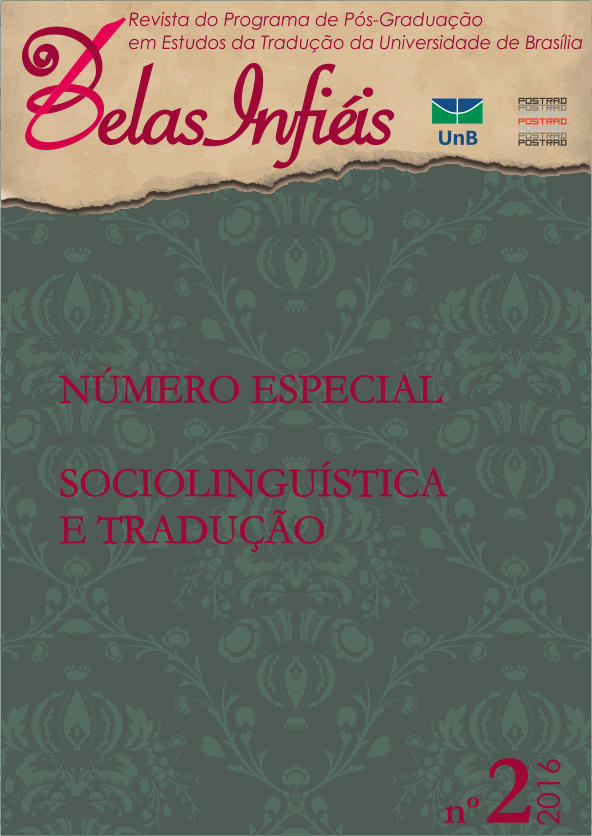DO CRIOULO AO “CRIOLLO”:
TRADUZINDO A LÍNGUA DE ESCRAVOS DA AMÉRICA PORTUGUESA PARA A LÍNGUA DE ESCRAVOS NA AMÉRICA HISPANA NO SÉCULO XIX
DOI:
https://doi.org/10.26512/belasinfieis.v5.n2.2016.11389Palabras clave:
Tradução, Identidades, Português para o Espanhol, AbolicionismoResumen
Partindo dos conceitos de comunidade, identidade e linguagem de Le Page & Taubouret-Keller bem como da investigação sobre as línguas afro-americanas de John M. Lipski, o presente artigo pretende discutir quais as ferramentas adequadas para traduzir as falas de personagens cativos na literatura brasileira do século XIX para o espanhol. Segundo a hipótese de Lipski, o “crioulo” afro-hispano não chegou a existir como língua estabilizada nos territórios das colônias hispano-americanas. Contudo, na literatura abolicionista cubana ficaram o registro temporal e a evolução da linguagem dos escravos africanos daquela época, que servem como ponto de partida para o trabalho de traduzir a língua africanizada do português ao espanhol.
Referencias
AGUIRRE, Carlos. Silencios y ecos: La historia y el legado de la abolición de laesclavitud en Haití y Perú.In:Revista A Contracorriente,Raleigh, Carolina do Norte, EUA, v.3, nº1. p. 3-37, 2005.
LE PAGE, R.B., TABOURET-KELLER, Andrée. Acts of Identity: Creole-Based Approaches to Language and Ethnicity. Cambridge: Cambridge University Press, 1985.
LIPSKI, John M.A History of Afro-Hispanic Language: Five Centuries, Five Continents.Cambridge: Cambridge University Press, 2005.
______. Las lenguas criollas afroibéricas: estado de la cuestión. Invited lecture, Universidad Católica Andrés Bello, Caracas, Venezuela, Maio1997. Disponível em: http://www.csub.edu/~tfernandez_ulloa/HLE/LIPSKI-
LENGUAS%20CRIOLLAS%20AFROIBERICAS.pdf. Acesso em 21.06.2015
MCWHORTER, John. The scarcity of Spanish-based Creoles. In: Language in Society. Cambridge University Press, v. 24, nº2. p. 213-244, Abril 1995.
______. The missing Spanish creoles: recovering the birth of plantation contact languages. Berkeley: University of California Press, 2000.
PICHARDO, Esteban. Diccionario provincial casi razonado de voces cubanas. La Habana: Imprenta de M. Soler, 1849.
SAUMELL, Rafael E.Juan Francisco Manzano y Domingo del Monte: El cercopolítico de la plantación.In: AfroCuban Anthology Journal (A Bilingual Journal of Social Sciences and Humanities). Outono, 2004. Disponível em: http://www.afrocuba.org/Antol3/Books3/Manzano%20y%20del%20Monte.pdf Acesso em 21.06.2015
SILVA, Liliam R. Vozes negras no romance hispano-americano. In: II Seminário Internacional de Língua, Literatura e Processos Culturais, 2014, Caxias do Sul. Espaço, Território e Região. Caxias do Sul: Editora da UCS, 2014. p. 527-537. Disponível em: https://www.ucs.br/site/midia/arquivos/II-Sillpro-Trabalhos-Completos_3.pdf. Acesso: outubro de 2016
WAGNER, Max Leopold. Lingua e e dialetti dell'America spagnola. Florencia: Edizione Le Lingue Estere, 1949.
Descargas
Publicado
Número
Sección
Licencia
Copyright Statement
Given the public access to this journal, the texts are free to use but requires the recognition of the original authorship and initial publication in this journal to be properly stated.
The journal allows the use of works published for non-commercial purposes, including the right to submit the work to publicly accessible databases. Published contributions are the sole and exclusive responsibility of the author(s).
- When submitting papers to be evaluated by the Belas Infiéis journal, the author(s):
- Declare that the contents of the contributions are original and of their original creation, being entirely responsible for their content if there is an objection by third parties.
- Claim to be aware that they should not commit academic plagiarism.
- Declare that the manuscript has not been published, completely or partially, in Portuguese or another language. If it is a translation it should be submitted to the Translated Articles section.
- Declare that the manuscript is not being evaluated by other journals.
- Declare that the manuscript was not submitted to another journal simultaneously.
- Commit(s) to inform the journal of any kind of error or inaccuracy in their contribution (published, in evaluation or in editing) and to collaborate with the editors to make due corrections of the article (when in evaluation or editing) or erratum/retraction (after publication).
- Declare that there is no conflict of interest regarding the published work.
- Authorize its release if it is accepted for publication without any kind of monetary compensation.
- Agree to assign non-exclusive rights to publication to the magazine, remaining free to make their contribution available in other media as long as the publication of the first version in Belas Infiéis magazine is mentioned. They also authorize Belas Infiéis to assign their texts for reproduction in content indexers, virtual libraries and similar platforms.
- Maintain copyright and grant the journal the right of first publication, the work being licensed under theCreative Commons Attribution License.
- Is/Are allowed and encouraged to publish and distribute their work online after the editorial process, which may increase the impact and citation of the published work.
- Authorize the editorial team to make textual adjustments and to adapt the article to the publication rules, when necessary.



















